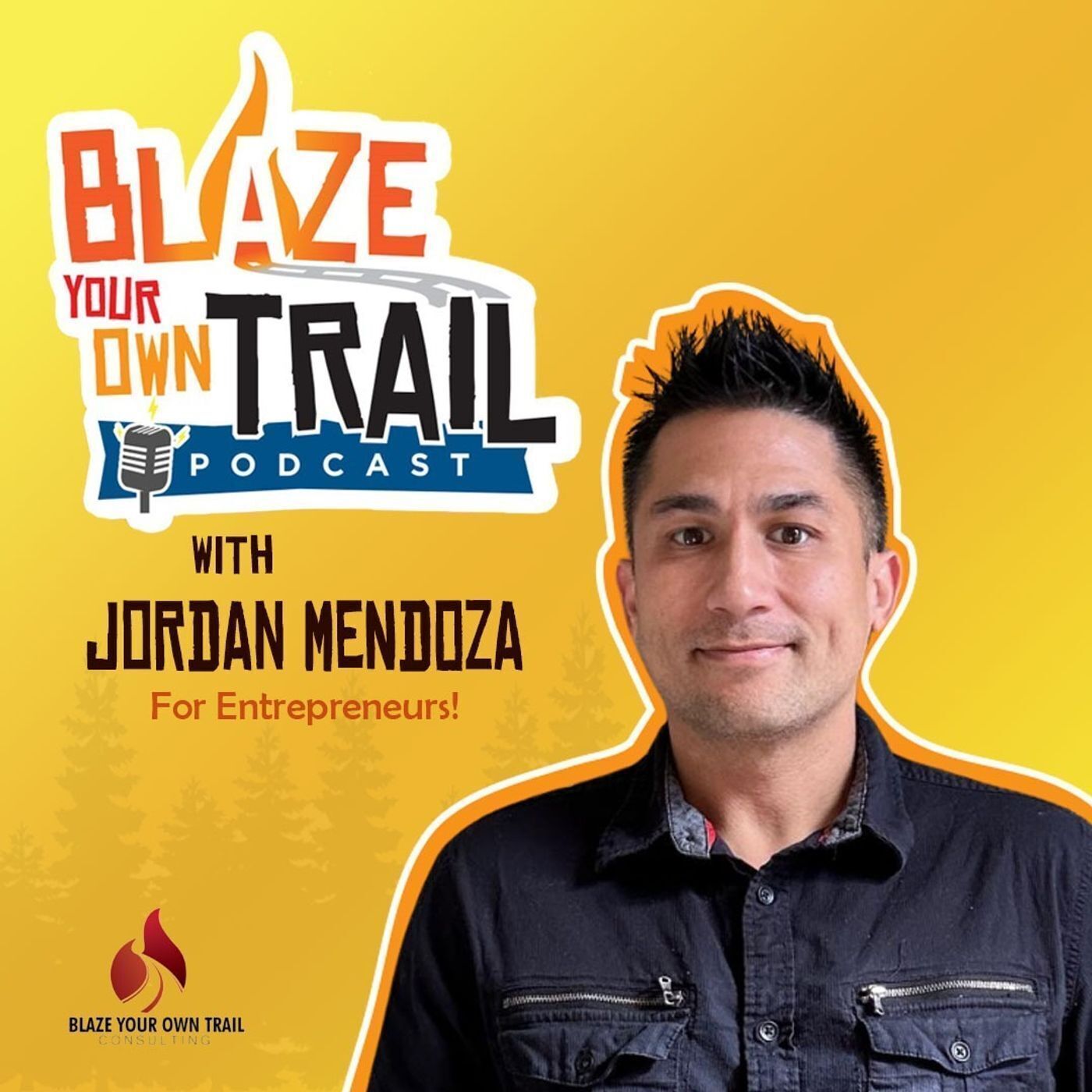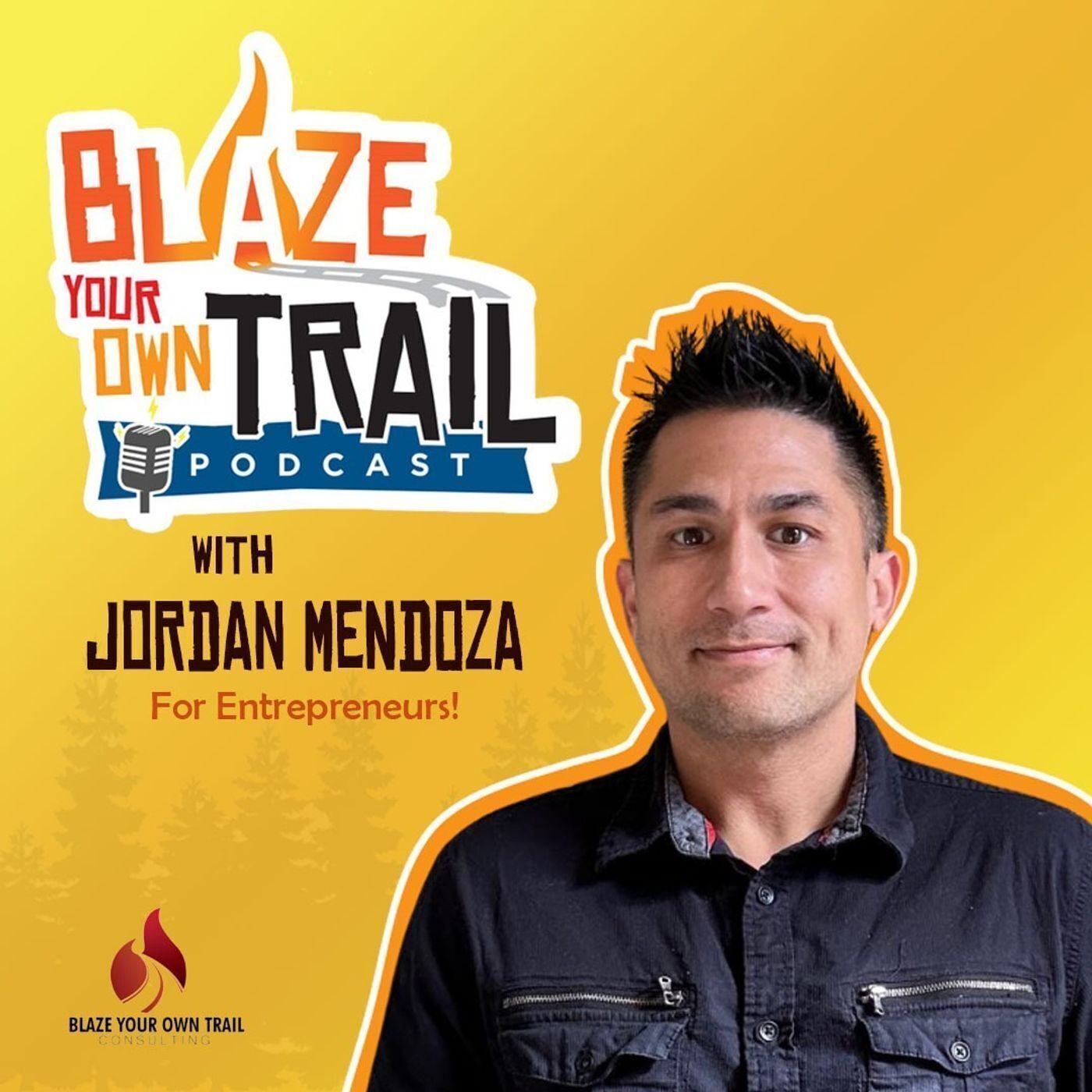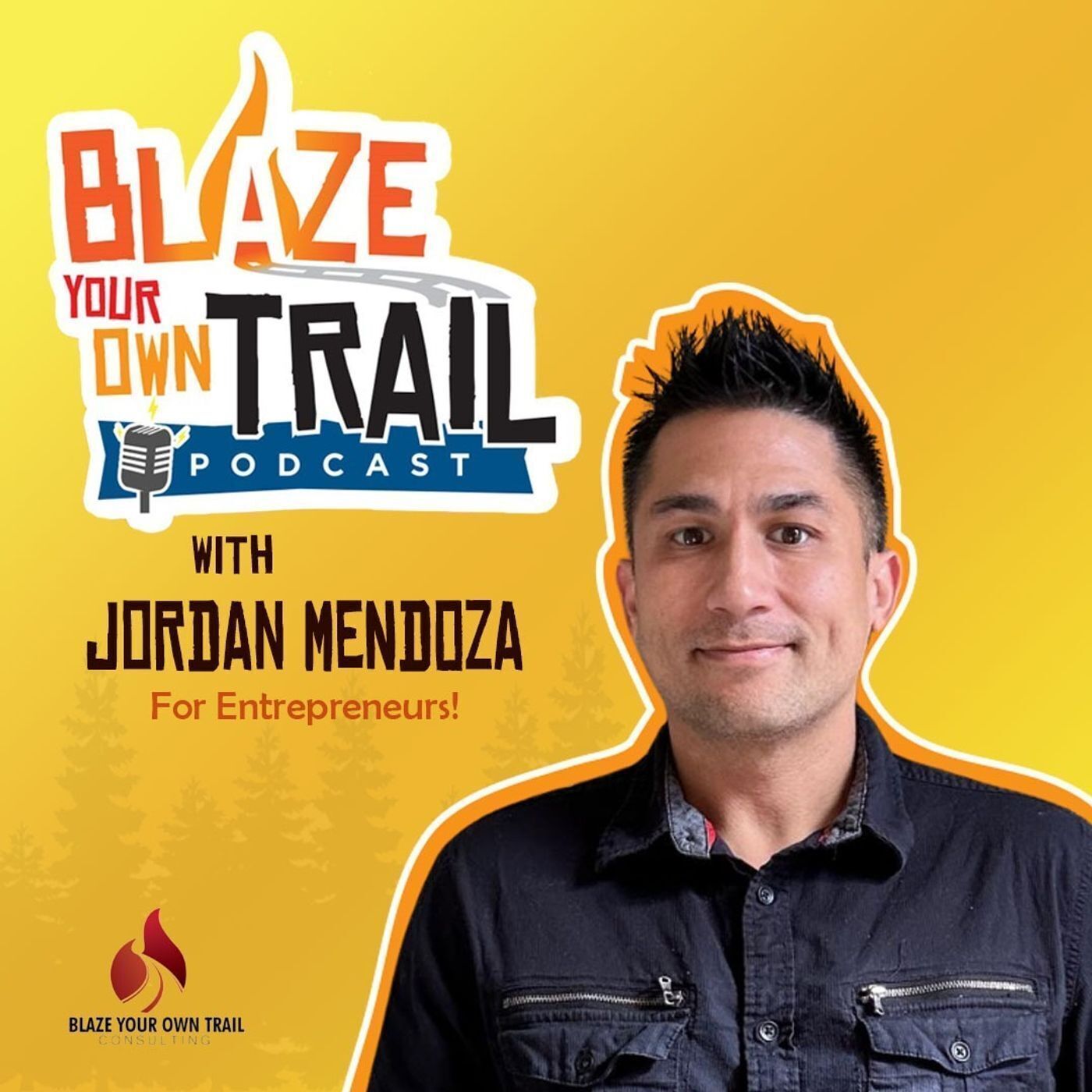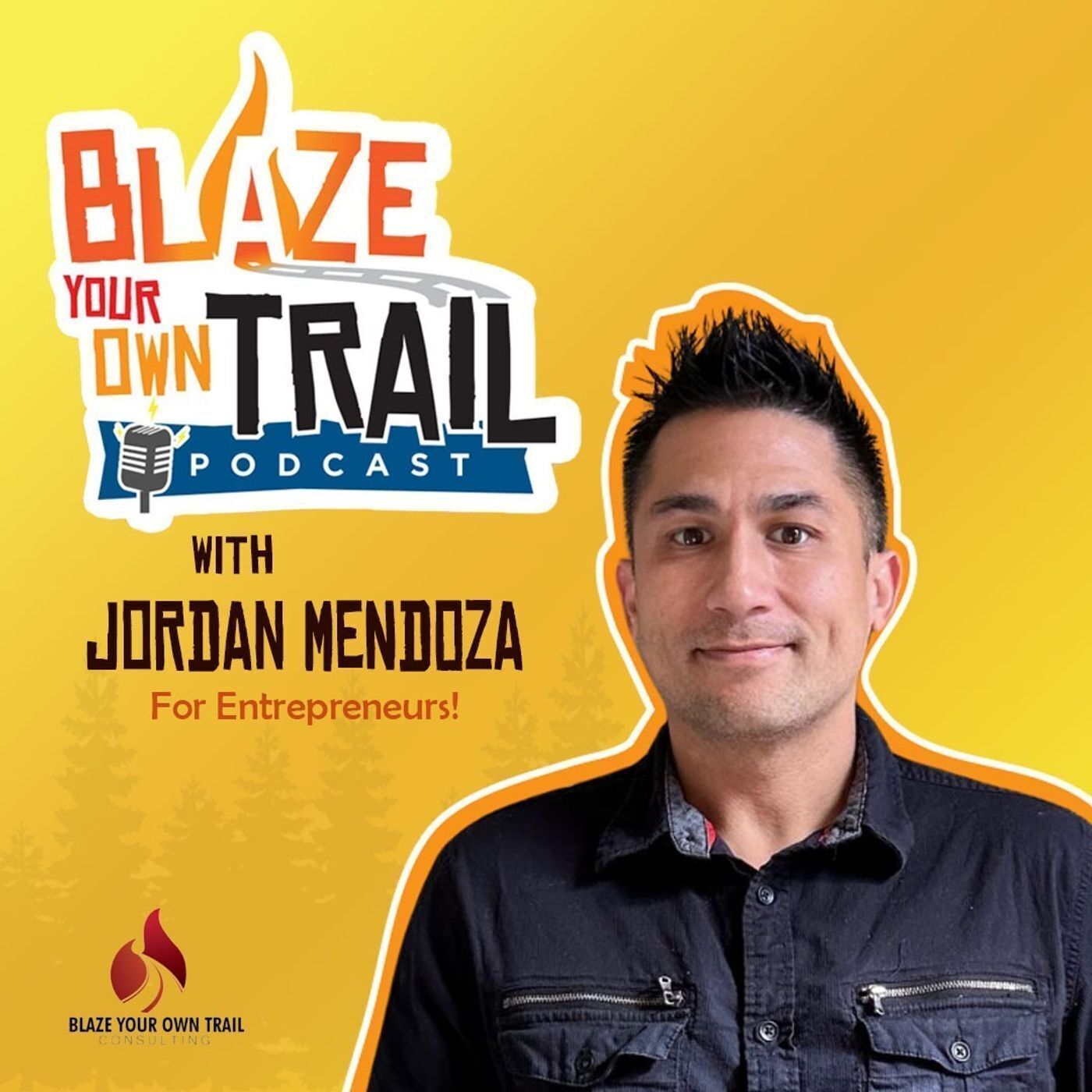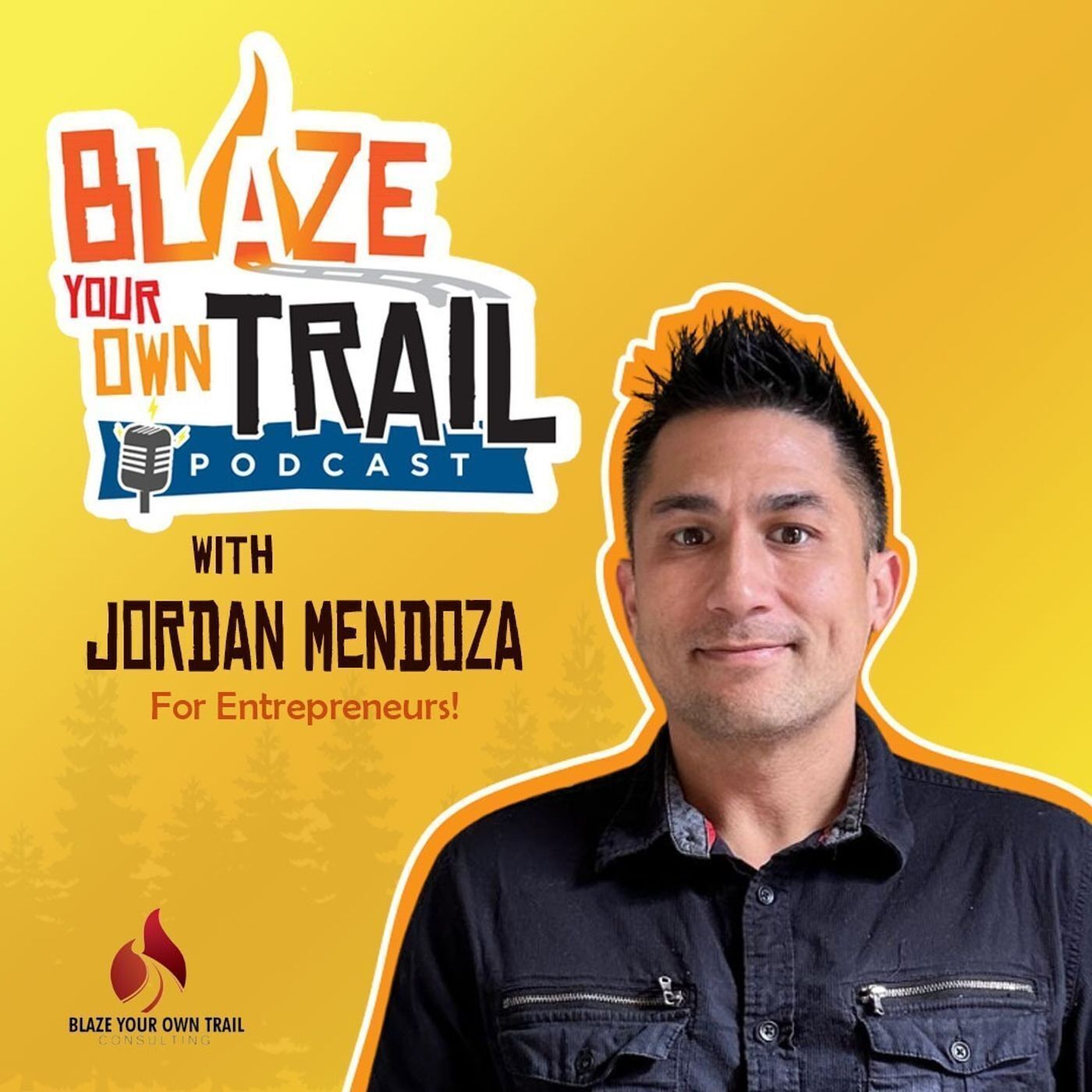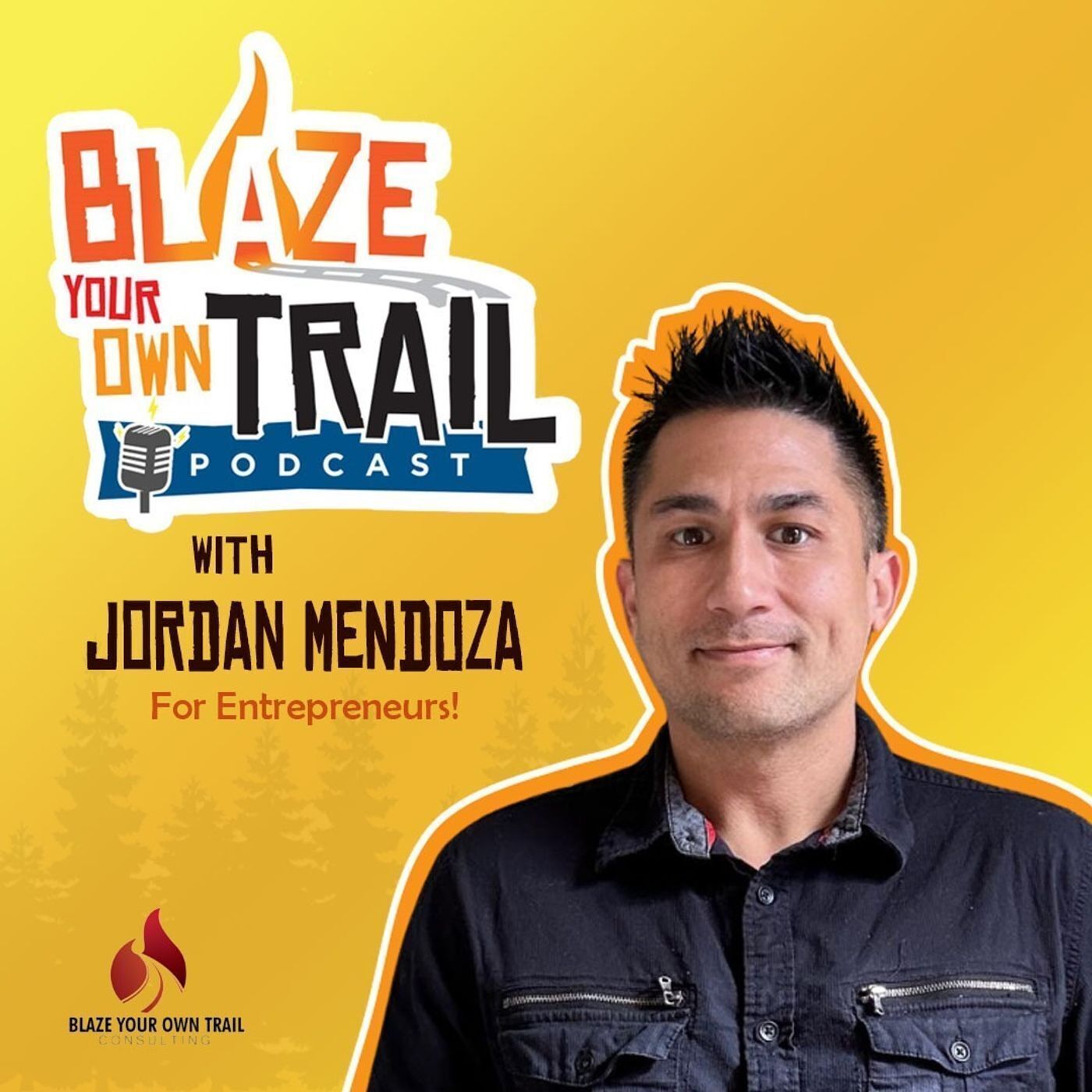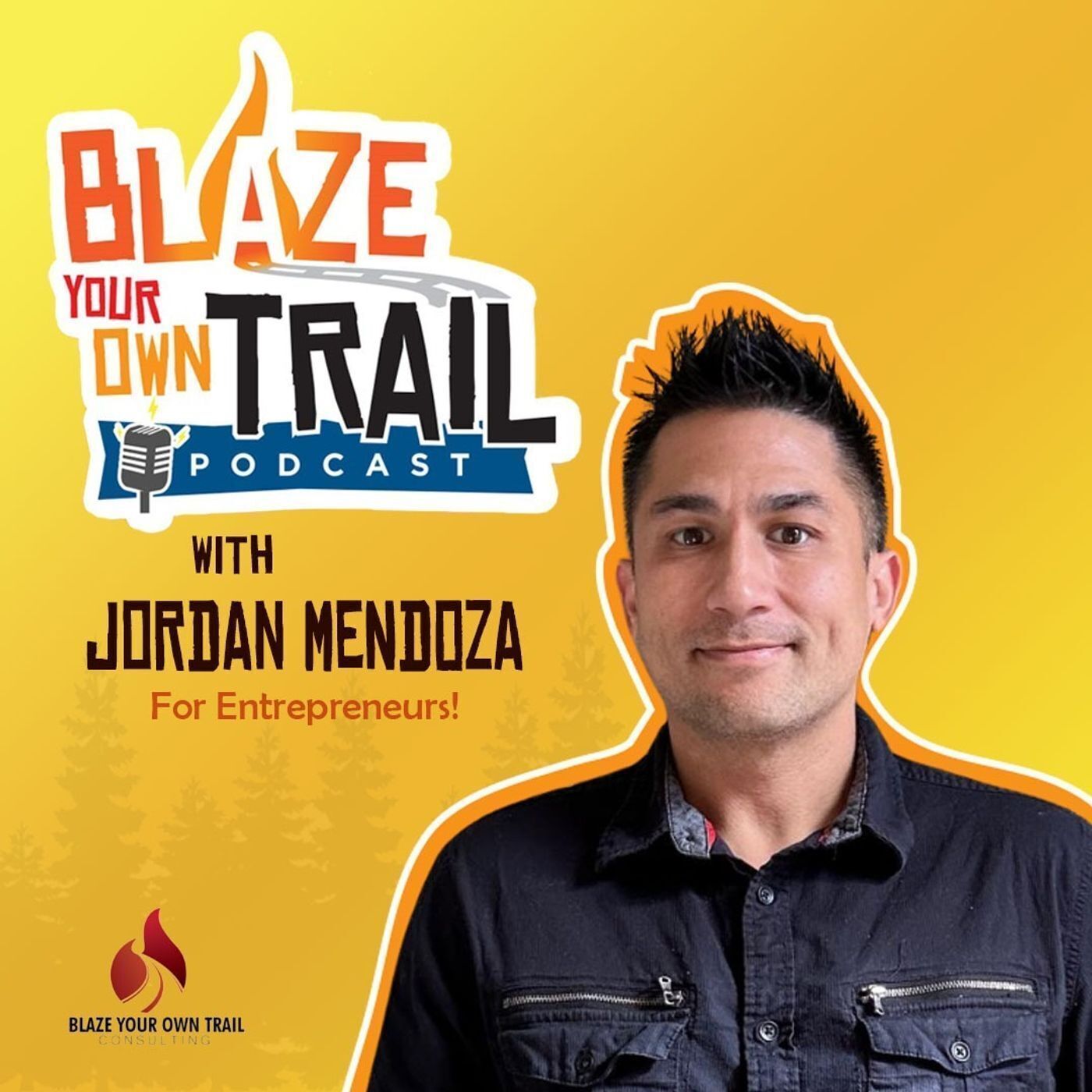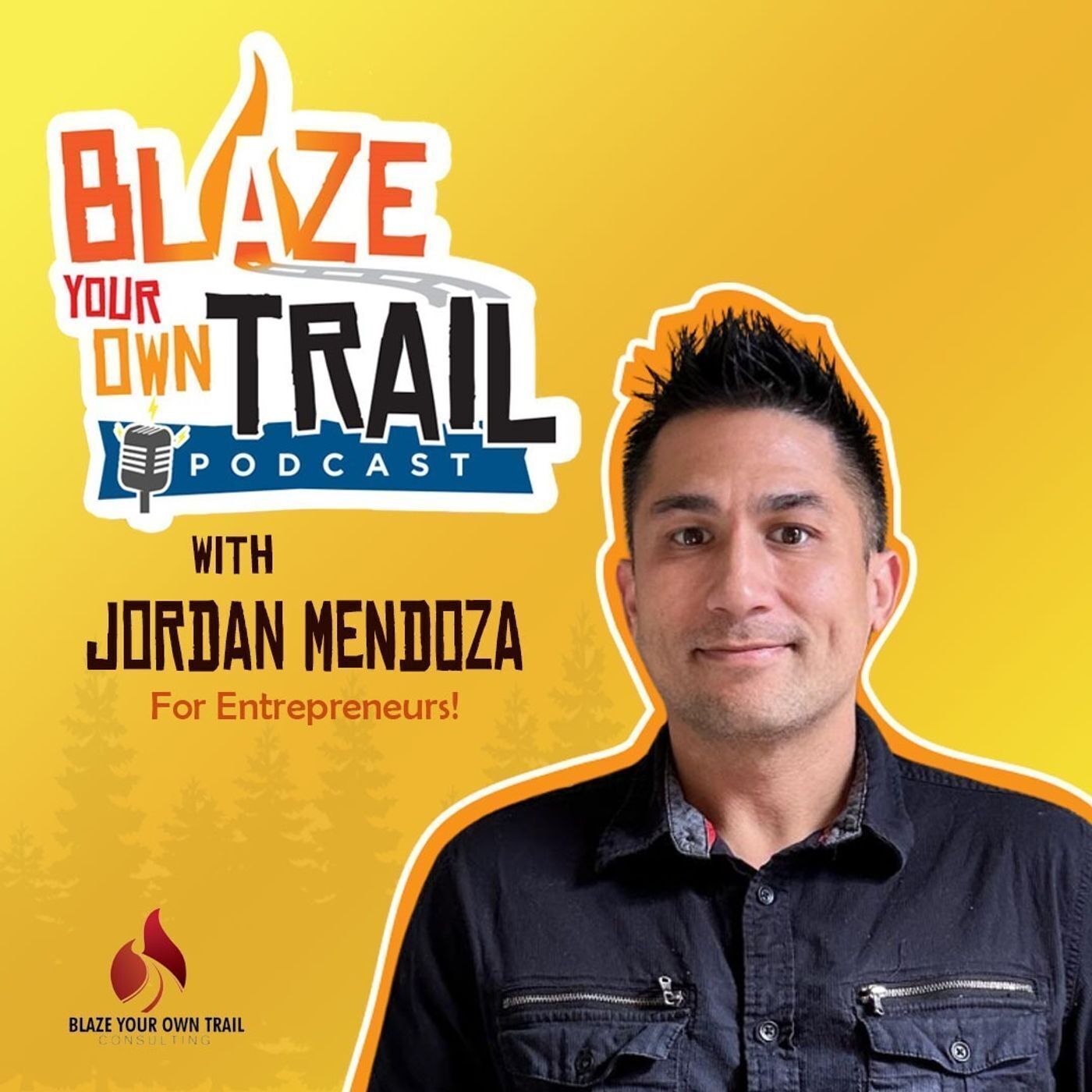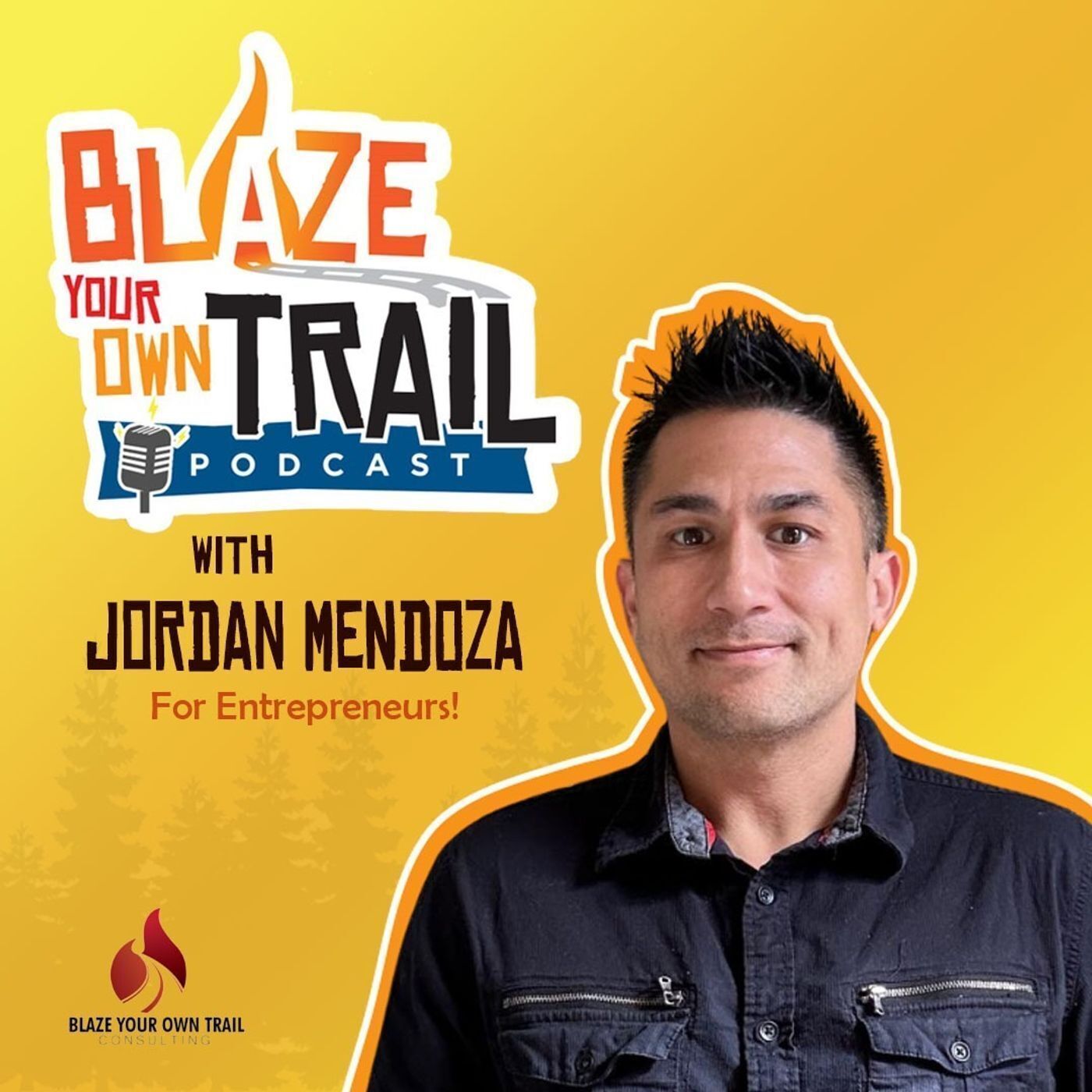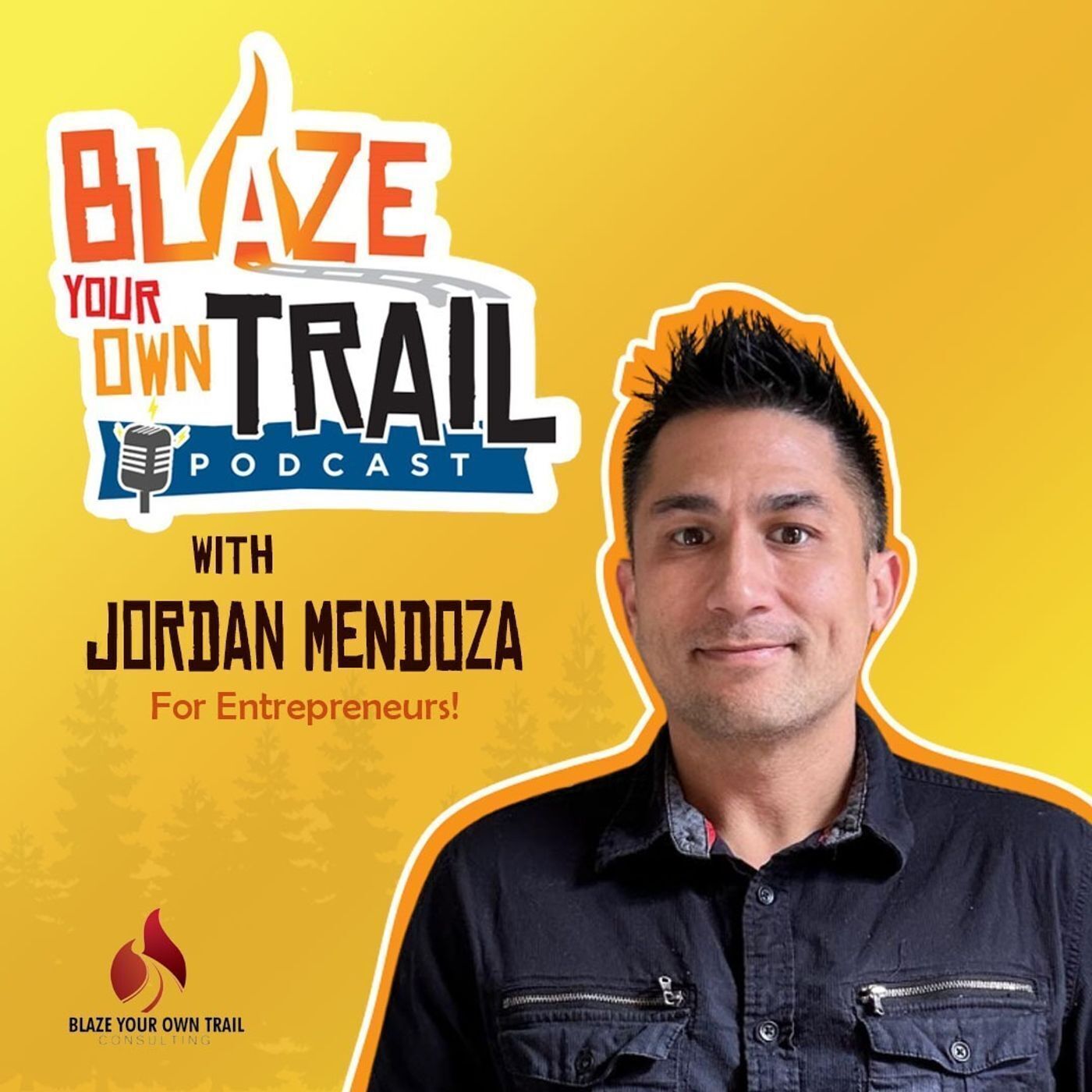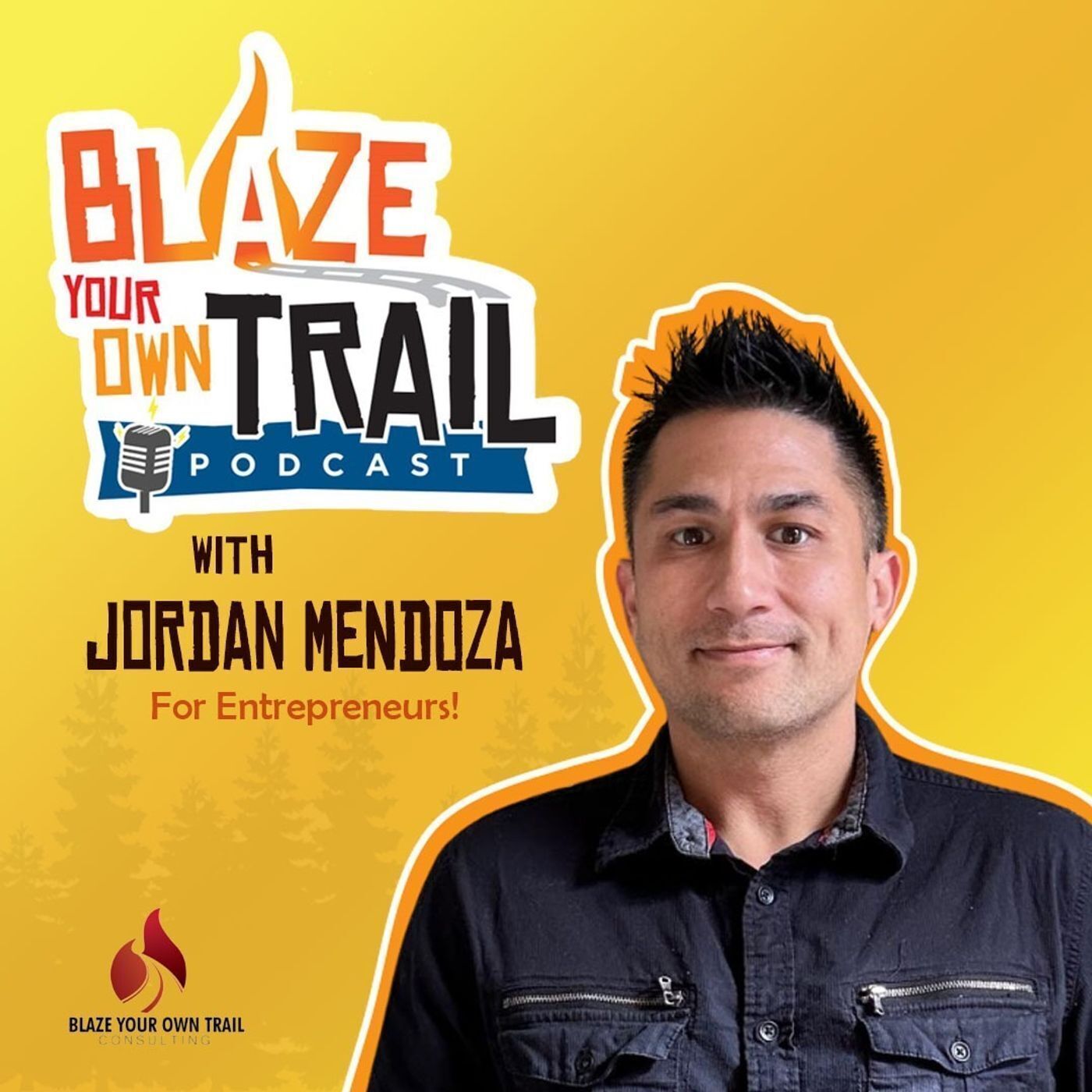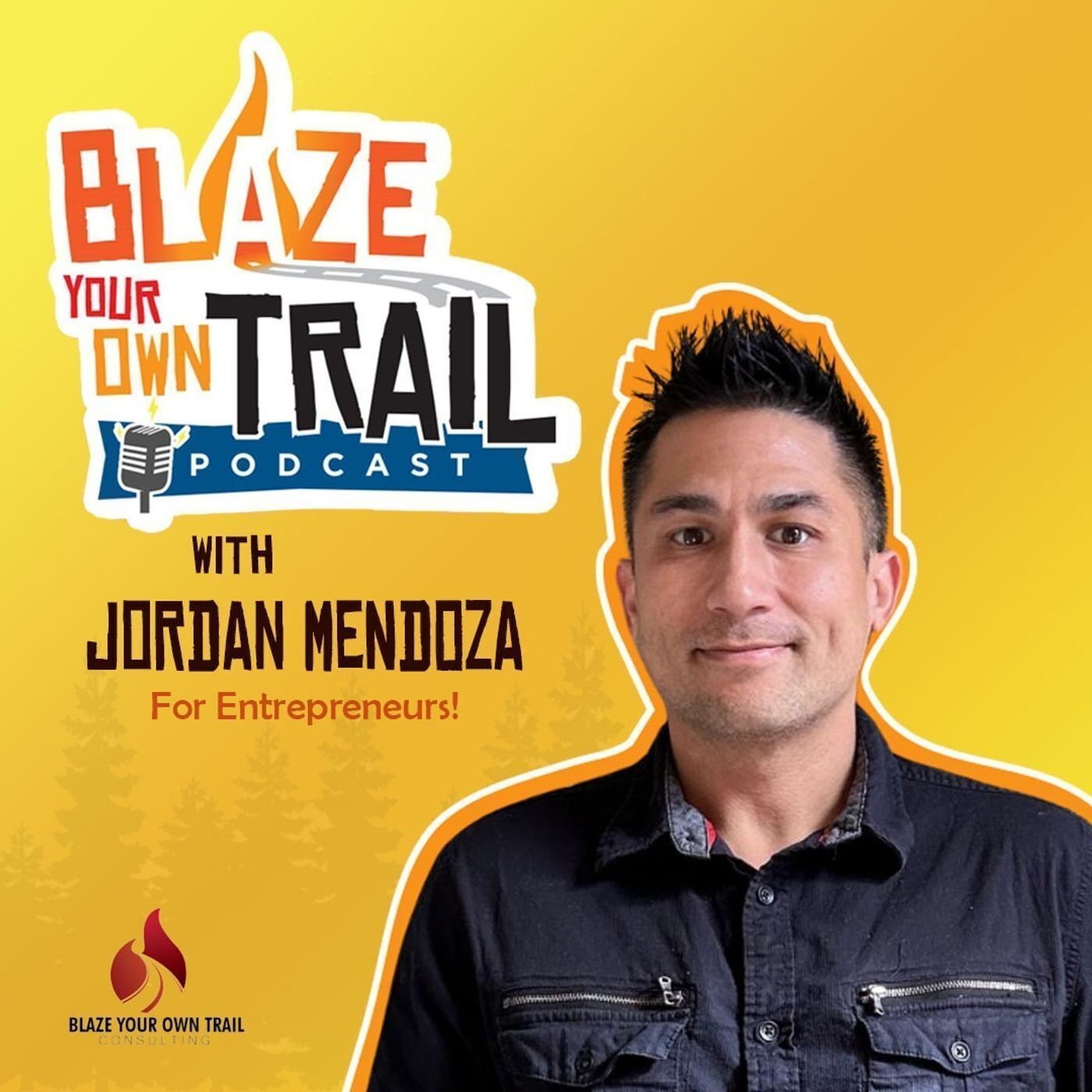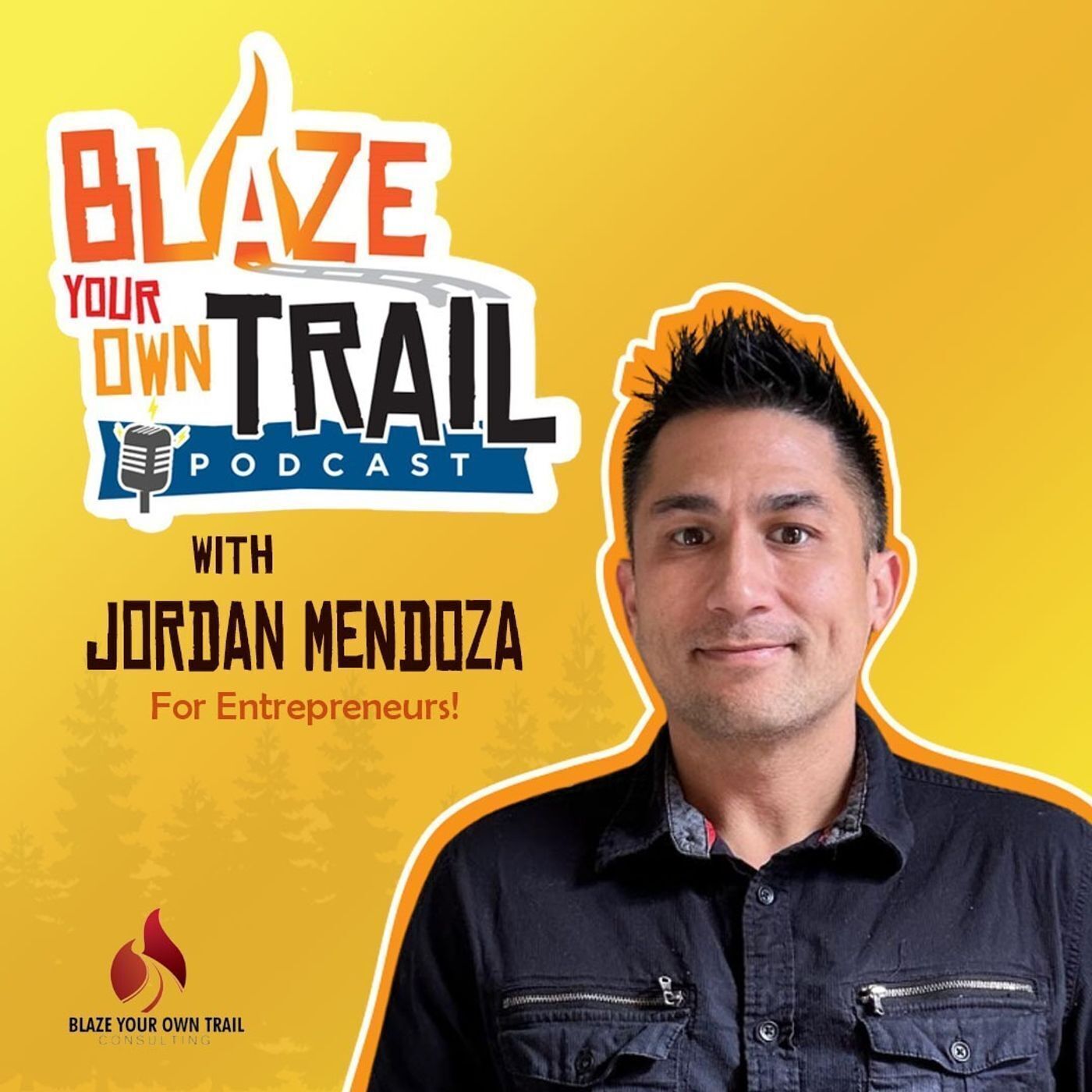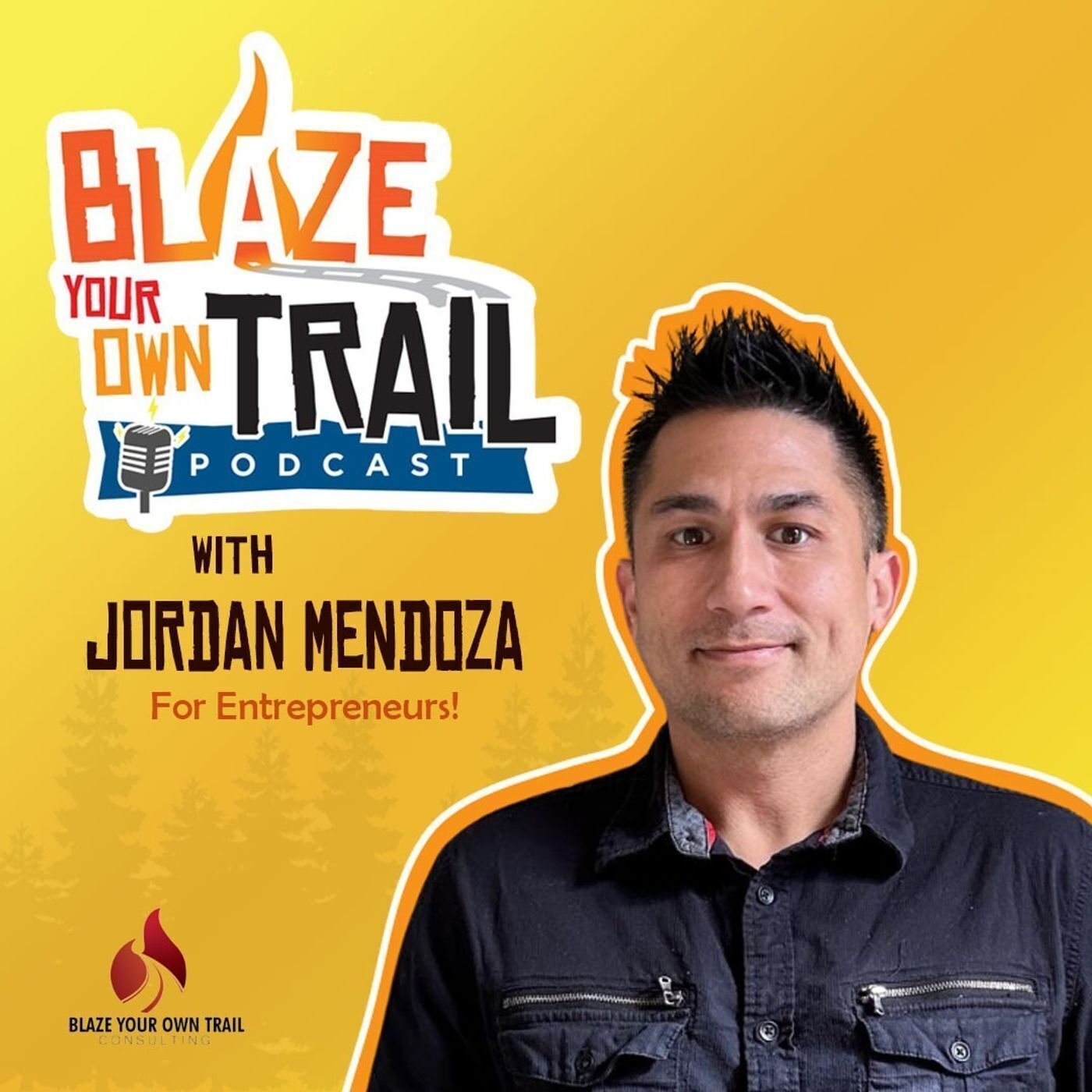Transcript
Jordan Mendoza (00:02.124)
Hello everyone and welcome to the Blaze Your Own Trail podcast. My name is Jordan Mendoza, I'm your host and I've got a very special guest today. We've been trying to get this on the books for quite a while now. Laura D. Benedetto everybody. Laura, if you can tell everyone a little bit about yourself. Who are you? What do you do? Where are you from? And what are you up to?
Laura DiBenedetto (00:24.568)
Sure. Well, hi everybody. Laura DiBenedetto. It is awesome to spend time with you, Jordan. Only three years past due. This is so great. We finally get to do this. What I do is I help business owners and aspiring business owners to finally live into the potential that they've been dreaming of. They secretly know they're meant for more. They just don't know exactly what to do to actually step into that. So I help to clear the runway and make it super easy. Let's build a seven and eight figure business.
it's been, it's been an absolute pleasure to do this kind of work and to help people transform. So I live in Florida and, married have three furry children and whatever else you want to know. tell you.
Jordan Mendoza (01:01.005)
Love it.
Jordan Mendoza (01:08.835)
Awesome. Appreciate you sharing. And my favorite part of the show, Laura, is truly taking a rewind and getting deep context into my guest's story, their journey. And so in order to do that, let's go back to the younger version of Laura. So we're talking about formative years, elementary, middle to high school years. So where were you born and raised? And then what kind of kid were you? What type of things did you get into in your younger days?
Laura DiBenedetto (01:33.582)
Cool. I grew up in Charlton, Massachusetts. And when I say that, most people think I'm saying Charleston and I'm not. I'm saying Charlton as in Cowtown, Massachusetts. And let's see. I was a very rambunctious kid. I was very filled with life. I was that dirty little kid that liked to be outside playing with frogs and getting covered in grass stains and
pretty sure that my knees are popping now because of all the fun I had when I was, you know, that age. so growing up in Charlton, Massachusetts, it was very rural and we had a beautiful like three acre yard. My dad had worked so hard to transform our yard from like just this precipitous drop off.
into a beautiful paradise and mom and dad still live there and I'm going home in a couple weeks. I can't wait. It's so cool. Cause like there was this itty bitty little stream like way, down in the woods, like after this like cliff drop off, but like he had spent a couple of years with a whole bunch of heavy equipment because dad's allergic to sitting still. Gee, I wonder where I get it from. And he's like, Hey, what if I turned this into like sloping rolling hills and like, you know, widen the stream and made a pond. So
That worked out great for me because when I was a little kid, I'd be down there catching froggies and seeing if I could flip over logs and find salamanders and newts. And yeah, I was that kid and I was extremely rambunctious and I hated school, but I was very artistic and I was good at half my subjects and hated the other half and giving my mom all her gray hair. That was me for sure.
Jordan Mendoza (03:10.531)
Yeah, we sound very similar and on the rambunctious end and not enjoying school and I definitely preferred breakdancing in the halls over you going to my classes in high school. So that was but if I liked the class I would do well if I didn't I just didn't pay attention. Yeah, so a lot of the referrals. Yeah.
Laura DiBenedetto (03:19.95)
That's awesome.
Laura DiBenedetto (03:26.22)
Yeah, same, for sure. I love science because they're like, hey, look what you can do. you know, all that stuff. But then it was history. Boring.
Jordan Mendoza (03:34.891)
Yeah. And people in business talk about, how do you get referrals? I'm like, man, I got them all in high school. Got lots of referrals to the principal's office. so did you get into outside of the, you know, liking the subjects that you like, were you, you know, obviously you were athletic outside, but did you get into any sports, anything like that?
Laura DiBenedetto (03:41.143)
Hahaha
Laura DiBenedetto (03:56.078)
not really in the way that you'd think mom actually signed me up for tennis. but I had those really crappy, thin sold shoes, not like the fix old ones and the pavement was like hot. So I was that person. I would be trying to do like a ballet plie on the white lines on the tennis court because my feet were burning. yeah. So I was just crazy. Like I would just jump rope for fun. I mean,
It was crazy. was always doing all kinds of neat stuff. I didn't do any sports. I've only gotten, I don't know, I say athletic in air quotes in, you know, in my forties. And now I go to the gym and I pick things up and put them down for fun. I love hiking, you know, snorkeling, recreational things. If it's not fun, I don't want to do it. Dancing is my absolute fave. I did dance lessons before. I don't know. I just like being active. Sitting still is horrible.
Jordan Mendoza (04:52.149)
Yeah, that's good. Being active is a good thing for sure. So in school for you, when you finished high school, did you have any aspirations to go to college? Was that a route that you had in your mind and focused on or did you start working? I'd love to know what kind of route you took.
Laura DiBenedetto (04:55.842)
Mm-hmm.
Laura DiBenedetto (05:09.102)
Sure. So mom and dad, this is hilarious. Mom and dad were entrepreneurs. All four of my grandparents were entrepreneurs. And for some reason, they all thought it would be a great idea if I went to college and went and got a job that didn't work out. So, you know, I went to college, I didn't want to go, but I also didn't know what I wanted to do either. And I, let's see, I was there for probably a year and a half. I ended up dropping out and I was like, this is dumb.
And I ended up starting a business at 19 and largely because I was deeply unemployable. I was like, I hate this job. I'm going to quit that. Oh, they just fired me. Huh? Well, since I don't like jobs very much, I should probably just build a company because then nobody's going to fire me. And then if I quit, I don't eat. So I'm held accountable. Like, let me tell you, like I have been a rebel my whole life.
My mom tells me stories of when I was little, she'd be trying to hold me and I'd be like climbing out the back. cause I just was like, I don't know, couldn't sit still, never wanted to be controlled. I'm still the same way. Just bigger.
Jordan Mendoza (06:18.497)
There you go. And, and, yeah, when you're unemployable and a lot of it, just because you, you have so many ideas, you many thought you want to just go and you want to just do, and feeling like you're constrained or confined is not a, it's not a fun feeling, right? When people are telling you, telling you what to do, telling you when to do it, how to do it. You, your ideas, aren't being put into action. Yeah. That can be a very frustrating,
Laura DiBenedetto (06:36.898)
Not really.
Jordan Mendoza (06:48.365)
feeling.
Laura DiBenedetto (06:49.396)
or having a job and then having someone tell you like a very counterintuitive way to do something and this is the way we do it. Why? Because that's the way we do it. Ooh, that logic doesn't work for me. I don't think I should be working here. Either promote me or fire me because what I'm doing is not gonna work.
Jordan Mendoza (07:06.221)
So 19 years old, start your first thing. So what was the thing and when did the idea come about and what did you decide to create and then what did it end up turning into?
Laura DiBenedetto (07:09.195)
Mm-hmm.
Laura DiBenedetto (07:18.648)
Well, before I started the company, was working as the general manager at a motocross track of all things. And yes, I was doing the business side of things, but I was picking a lot of crumpled bodies off the track too. And, you know, I never knew I had the stomach for that. I guess I do. So I started a business doing websites and stuff like that. And I had no idea that it would turn into a 25 year old company.
with a legacy and a wonderful staff and a very loyal client base all these years later, we're celebrating our 25th anniversary now. And for those in the audience who can do math, yes, I'm 44. It's something I'm really crazy proud of. Like I started it just because I wanted to own a job, which I actually discouraged people from doing now. It's like, no, you should own a company. Let me help you build that. But I'm so glad that I went that route because I learned so much of what not to do. I learned
you know, what it's like to own a job and how detrimental that can be to your health. And then what it's like to try to scale the wrong way. And then what it's like to try to scale the correct way. And just having all of this incredible breadth of experience has been massively helpful to the coaching work that I do now to help entrepreneurs scale. So I own the marketing agency and I'm doing the coaching now, but it all started because
You know, when I was working at the motocross facility, somebody had built a website for us and I disassembled the whole thing. I wanted to see how everything worked. I've always, I was that kid. I would take, I would take apart my toys. I don't know if you were that person and put them back together. Now I'm the adult who takes apart my toaster and puts it back together. Cause I want, know, and takes apart my kitchen aid. Cause it's like, a little funny. I think we need to go ahead and grease the gears. Huh? My husband, my husband's constantly looking at me like, are you sure you know what you're doing? No.
That's what makes it fun. Let's do it. So yeah, I just took everything apart and I was like, I really like this. So that's what started my business. And my very first client was a motocross retail store.
Jordan Mendoza (09:32.003)
Motorcross retail. So that's great. you obviously were working in that space. had re-done essentially the site, put it back together and you're like, man, I enjoy it, A, but want like the challenge of it, I'm sure. And then the first client happens to be in the same vertical, which probably made it a lot easier to execute and to deliver. Yeah.
Laura DiBenedetto (09:54.062)
Well, I knew people. I didn't realize at the time that it's called networking, but I was just like, I know people, I need clients and I'm not doing that anymore. So, uh, how do I get a client? Just started calling people like, Hey, I'm starting a business. want to do a website for you. Do you need one? I mean, my sales pitch was terrible at the time. Awful. was basically what I just described. You know, I was 19. These people gave a young kid a shot and I appreciate that.
Jordan Mendoza (10:13.539)
You
Laura DiBenedetto (10:21.346)
all these years later, like I, you know, I haven't kept in touch with these people over the last 25 years. I wish I had, cause man, it would be so cool to be like, Hey, I actually turned out okay. And you played a role in that. Thank you.
Jordan Mendoza (10:34.211)
So how many clients from the start of the business and now are still there? Are there any that you are still communicating with and keep in touch with?
Laura DiBenedetto (10:44.114)
we have clients that, I'd say our oldest client is probably like 15 years old, but in the beginning, the business was all project work. So it wasn't like recurring projects and recurring relationships like I transitioned into later. so when I began to transition into recurring projects and a retention model, I still have a lot of those clients now. Turns out when you treat people really well and you deliver on the promises you make, people stick around.
Jordan Mendoza (11:12.383)
Absolutely. so thinking about your, the products that you offer, you mentioned before it was like project based. So you maybe, Hey, I want, have this website is what we want to look like. And you guys will deliver on that project. And he said, now you're doing more recurring stuff. So how has the business evolved from when you were 19 to today? And I'm sure that, you know, digital marketing, you know, coming into play a lot of the different
Laura DiBenedetto (11:30.349)
Yeah.
Jordan Mendoza (11:39.895)
technologies come into play have had to have shift the business in some capacity, but I would assume for good, right? From a speed standpoint and being able to work more efficiently. So just talk a little bit about the shifts and changes that you've seen from the launch of it and to today.
Laura DiBenedetto (11:49.773)
Yeah.
Laura DiBenedetto (11:58.464)
sure. Well, the operational changes that we made were going from project fulfillment where I and ultimately a team of people with me were fulfilling orders. We were very much order takers. Once I had enough skill and understanding of the market, human behavior, stuff like that, it was like, well,
I think we need to transition into marketing services on a regular, consistent basis and helping people to attract their ideal customer. So it went from order taking with projects to now we're calling the shots because our clients don't want to. And they were just like, it was, I kind of wish I'd done it earlier, but I didn't know any better. For the last like 15, 15, 18 years, the agency has been doing
Like done for you, but let us drive and we want to tell you how it should work. So you don't have to think about it. You just tell us what you want to achieve. Let us own the outcome. So we own the outcome. We work on those things and there's been a lot of transition operationally, but then there's also been a lot of transition technically, where things haven't changed actually is how people think people are still the same. People are still operated by fear and greed. People are still motivated by,
FOMO, which wasn't called that 25 years ago. It was really just, you know, fear of loss. And now it's like FOMO. so a lot of the terminology has changed, but human psychology is still the same, which is really helpful. Thank God, because the technical aspects of marketing, man, they've changed so much. mean, when I started Facebook was not a thing. MySpace was not a thing. These didn't exist. Yes, folks, I'm that freaking old, but like they didn't exist when I started my business and I'm
You know, I was able to use these things personally, but then like, I was always asking the question, okay, well, how do we leverage this professionally? Can I use this for clients? I remember when Facebook actually first started to become commercially relevant. my agency was one of the very, very first ones in Massachusetts. And to my knowledge, we were the first, asking how do we leverage this professionally and how can people use this? So I was actually asking, all these questions and ultimately I ended up leading a lot of.
Laura DiBenedetto (14:23.192)
courses and classes for people in the Massachusetts area to learn how to leverage social media to actually get business from it. I remember little tiny me doing that little baby business owner. Go me. Yeah, there's just been so many crazy changes over the years and now we have like AI tools that we didn't have before. So there's been a lot of evolution and if it bothers you to be in a fast paced world, you know,
Jordan Mendoza (14:38.398)
That's great.
Laura DiBenedetto (14:52.406)
and you don't wanna get whiplash, this would be a horrible field to be in. But it's nice because my team, who've all been with me for a number of years, it keeps it fresh and interesting and tools like AI, they're helpful to an extent. They're more like time savers, it's more like digital assistants, they're largely terrible at like content creation. And honestly, I think that's good because it keeps us honest and it keeps us.
continually creating things using organic intelligence like our own brains, which will, in my opinion, continue to be superior to AI for the, at least for the near term future.
Jordan Mendoza (15:33.687)
Yeah, yeah, that's great. Yeah, AI is a tool. I think you hit it on the head, right? We can leverage it for speed. We can leverage it for ideation. But creation should be the people, right? Should be the ones creating and...
Laura DiBenedetto (15:47.49)
Well, yeah. And I mean, I I've been an early adopter of AI and I have, I've really liked it. I was the one that pushed my team to do it. And of course they were like, no, we don't want to do it. It's AI it's robotics. I've seen the movies and like, I've seen the movies too, and it's here to stay. So let's do it now. They love it, but you know, there's, there's always like, there's the hope of what it could be. There's the threat of what it could be. And then there's the reality of what it actually is. And I think a lot of people treat it like an Oracle, which is like super bad.
treat it like it's really good at certain things, but it's actually really not. It's brilliant at pattern recognition, which a lot of humans are not. So if you understand that and ask it to do what it's best at, it can help you really shortcut time quite a bit because you know how to prompt it because you're still the one leading with the right knowledge. But unfortunately, AI is trained to regurgitate the average of average. It doesn't know how to produce excellent. So if you input excellent, it can help you shape excellent.
I don't know if this makes sense or if this is too high level, essentially this is constantly what we're thinking about lately.
Jordan Mendoza (16:54.273)
Yeah, no, it makes sense to me and I think our listeners will definitely get it. you know, it's something that has to be coached and trained and fed. Like you said, prompted the right information, the right context, you know, because that's the thing. It doesn't have emotions. It doesn't have feelings. So, so, yeah, yeah, a hundred percent. Definitely trust, but verify for sure.
Laura DiBenedetto (17:02.914)
Yeah, for sure.
Laura DiBenedetto (17:07.683)
Yeah.
And don't always believe it, it lies. It lies.
Laura DiBenedetto (17:17.258)
Yes. Yes.
Jordan Mendoza (17:18.883)
So, so let's talk about the, you start this business at 19, you're, growing it, you're, you know, things are shifting in the, in the world, right? With, with online, with social, I mean, there's all these different things that are happening throughout this time, uh, for the audience's sake during all of this, do you, do you end up starting other businesses, uh, in the process? And I know that you're a published author, author. talk a little bit about.
You know, what prompted you to write your book and get it out there and to want to be able to help people in the capacity that you do.
Laura DiBenedetto (17:53.23)
Sure, I would love to. I have started a couple other businesses. So I think the number is seven at this point. I love business. And anytime I see a problem, I always want to wrap a business around it because that's just how I think I indoctrinated myself into the ideology of entrepreneurship. And like, I'm a huge believer. I'm out there making the Kool-Aid and here have some, please be an entrepreneur. It's good for you. It'll introduce you to yourself. It's so great.
So every time I have an idea, it's like, could be a business, but I've started different things. I've killed off, I would say most of them, but I'm still glad that I've done it because throughout those things, I've learned a lot about what works, what doesn't work, how to get funding, how to shut down a company, how to do all these different things that a lot of people have questions about. So what I have now is just two companies.
And there's the marketing agency that's called Vision. And then I also have my other business, which houses my book and my coaching program. So the book actually came about because rewind back to Laura at like 22-ish and I read that book, Rich Dad Poor Dad. Did you ever read that?
Jordan Mendoza (19:20.738)
Yes.
Laura DiBenedetto (19:21.582)
Yeah, so it was like massively inspirational for me. was like, wait, I can be rich. What? Not just have a job. That sounds so good. Okay. Um, I grew up on food stamps, just so we're clear and you know, dad was and is disabled. So the idea of like abundance and prosperity was so far into me, but it sounded so amazing. So it made me want it. And I wanted to provide for my parents and I wanted to be able to have nice things and whatever. So, um,
the idea of passive income really stuck with me and the idea of like owning assets. So at that time, my business wasn't set up in such a way that it could really function the way I wanted it to, but I had worked very diligently until 2016 to build it to be a system that could run itself. I wanted a self-managing company and something that could be truly passive income for me.
So then I brought someone on in 2016 and I spent two years training her and a year and a half. In 2018, I retired and I didn't wanna work anymore. I was like, great, I have my passive income. I checked the box, loving life. This is so great. But then the aftermath of having all this silence and time and space.
and then money to spend and all that stuff, I realized I'm not very happy. I'm actually kind of miserable and I'm fighting with my husband and I'm kind of a dirt bag. Like this is not cool. What is wrong with me? So I started asking the question like, well, first of all, what is happiness and did I completely miss the boat? It's not chasing money. Spoiler alert, it's not having the nicest car. It's not those things.
And I think in my 20s and 30s, I was socialized to think that he who has the most money wins and that makes you happy. But then I had actually achieved the money. I had gotten all of my time back, which is the ultimate wealth. So I was like crazy wealthy because I didn't have to work anymore and I had money coming in, but I was awfully miserable. So I asked that question and I was like, well, how do I, how do I actually be happy? Cause like this is, this isn't it. So of course.
Laura DiBenedetto (21:36.172)
that sent me on a crazy rabbit hole and I started studying human behavior. I started studying like a lot of different books, research and a lot of science. And I realized that, these are habits of the mind and my mental habits are actually very messy and they're super destructive and they're hurting me. And they've led me to be this actually physically sick, very grumpy.
really unpleasant person and I'm about to set my second marriage on fire and, I hate everything. So this doesn't work. So I was like, all right, well, how long does it take to, you know, form a habit? Is it actually 21 days? Like everybody tries to tell you, no, is it 30? No, it's actually 66 days. So I was like, well, let's hedge my bets here and like, just bump it up to 90. Cause a round numbers B let's just make sure I'm successful just in case. So I was like, all right, there's six.
cornerstones of how the mind operates in a habitual sense. Six of them. What if I spent 90 days rewiring my head by living in the positive version of these habits by force? I kind of like told the truth in advance. You know, like I would say stuff like, oh, you know, I would affirm like, oh, I love me. I'm beautiful. I love myself very much. Even though none of that was true in my head, I still said it because your brain doesn't know the difference.
So I was like, all right, I'm gonna do all this stuff. And after 90 days, honestly, after like 30 days, I was like a different person. But after the full 90 days, all of these habits were so, they were actually locked into my head and I had changed as a person. I had decided to move to Maui, my marriage was good, my health was returning. I had taken massive, massive strides towards becoming the best version of myself. And I was...
being the best version of myself. I was actually happy. I got the thing I wanted. So the book came about because I was like, yo, this is the Holy grail. I need to share this with people. I can't keep this to myself. And it actually started because I desperately wanted to share it with like two very unhappy friends of mine. And I started to just write out a bunch of notes because I know they'd never studied like the science of affirmations or like.
Laura DiBenedetto (23:50.67)
power of intention or like what boundaries look like. And I was just like trying to create like a little guide to explain it. Like guys do this 90 day thing. It will change you. So I'm like 30,000 words deep because apparently Laura is loquacious. Turns out I'm like, well, you know, if I just keep going, I'll actually have a book and then I can share it with not just two people. I can share it with thousands of people and I can actually change people's lives and make people happy. So I was like, you know what? Screw it. Let's do it. So that's where the book came from.
The 90 day thing came first, then the book. And then I got so charmed up. was like, this is great. I wonder if I could ever get to do a Ted talk. So I did one of those. And, so that was really neat. then, through COVID, I started working remotely with business owners to do coaching around habit stuff. But my love for entrepreneurship found me working with entrepreneurs and it actually got me to where I am now, where it's like, turns out.
so much of this six habits stuff is what my entrepreneur clients desperately need. And it's actually the reason they're not building their businesses to the size and scope that they want. It's the reason they're not happy. It's the reason they're getting divorces. So if I can take all of this with business stuff and create something massive that like really is life-changing, that would be the bee's knees. So that's where I'm at today.
Jordan Mendoza (25:17.183)
Awesome. Appreciate the context. Appreciate you sharing the journey because it's important. know, a lot of times we have these ideas, we have these things, and if we don't execute on them, then they don't ever come to fruition. Right. And I love what you said earlier. It's like, Hey, I just, I see a problem and I just turn and want to turn into a business. And my wife all the time is like, I knew you were going to try to turn this into a business, a company or something like that. Because that's just.
Laura DiBenedetto (25:28.429)
Yeah.
Laura DiBenedetto (25:41.157)
you have that problem too.
Jordan Mendoza (25:42.519)
That's the way that I just think I'm like, man, this, could monetize this easily. Do this, do this, do this. And I've, and like, if it were up to me, she would have already started like 18 businesses by now. She hasn't started a single one. So I'm still working on it, but I know, I know there's probably a gluten free cookie company in her future. So, but, but yeah, so no, I love that. there you go. And she is too. So we probably have some samples we need to send you so you can vet.
Laura DiBenedetto (26:02.796)
I have some recipes I can share with you. I'm gluten free.
Laura DiBenedetto (26:11.481)
no, I'm so upset as I slide my address over.
Jordan Mendoza (26:12.95)
Yeah, right. Exactly. but, um, but yeah, so now I enjoy that and thanks for sharing the context around you putting in the reps yourself, figuring out that even after a third of the time that it actually works doing the actual 90 days and then turning it into a book at the end of the day. So for people out there that might have aspirations.
to write a book, I'd love for you to share what process did you go through? There's so many different ways in 2025. You can do it, you can self-publish, there's hybrid, there's traditional publishers that want all the money and give you really not a lot, right? So there's so many different ways that you can go and path. So I'd love for you to share A, what way did you decide to go? B, what did you think about that process? And C, ultimately, would you change anything different about the way that you did it?
Laura DiBenedetto (26:49.495)
Yeah.
Laura DiBenedetto (26:52.898)
Yeah.
Jordan Mendoza (27:07.649)
you know, knowing now that hindsight's obviously 2020.
Laura DiBenedetto (27:09.592)
Sure. I would love to share this. my book is self-published. That was an intentional choice. And the way I wrote it, AI was not really quite a thing yet. So I actually wrote the book and I would absolutely do it again. I actually began the process of writing the book by grabbing a whole bunch of index cards and just taking stuff like this.
And I would write down the chapter idea, the main idea, and then subtopics and then next card. And it was nice because I'm such a tactile person. I can't keep my whole life in a computer. Like I just, I like paper. I wish I didn't like paper, but I do. So that was really helpful for me. And then I just started like jamming out and like, I wrote my book in 30 days. The editorial process took about nine months to be clear. but actually writing my crappy first draft, that was just my big brain dump.
That was 30 days, but then I was like, all right, so how do I publish this? Do I want to work with a publisher? Do I want to do self-publishing? I really just kind of hemmed and hawed about it. And ultimately I chose to self-publish for a couple of reasons. One, path of least resistance. Finding a publisher as just like a big fat nobody. was like, I don't really want to go through the process of trying to find.
you know, that middle man who's going to market me around. I don't know that I want to submit a book proposal when I want to write the book now it's in me now. And if I have to wait and shop it around, I'll probably just lose energy and it'll just fizzle out. So it's important to me that I write the book, but then I really wanted editorial control. What I really was afraid of happening was, hi control freak. How you doing? I really wanted to make sure.
that I didn't have a publisher saying, yeah, Laura, we really like this, but could you turn this into five habits? Because I know me, I'm the person who also quit a whole bunch of jobs. I'd be like, no, I don't want to write it now, go away. Like was extremely important to me that I held to the integrity of the content and the process that I knew for sure worked and I wasn't coerced into changing it because some executive in an office told me something, well, that'll sell better. I don't care about that. I'm writing this to help people.
Laura DiBenedetto (29:28.942)
It needs to maintain purity. the number one reason I chose self publishing was for editorial control. Number two, yeah, I do make more money on it. So my book retails right now for $14.95 on Amazon. Sometimes they put it on sale. That's cool. I get about $5 instead of one. So to be clear, I'm not making millions of dollars on a $5 transaction, but it's certainly the book has paid for all of the editorial
work that I had to do. It's paid for itself. Have I made a lot of money on it? No. But the main thing that I really wanted to do with the book, just from a purely altruistic perspective was to change lives. So when people get the book, they read it, they see the world a little differently. There's tons of exercises in there. There's like tons of like free workbooks and there's so many useful things. Like there's so many books and I actually really hate this. So many books that you can get.
And then you go to get the free download and the free download is actually garbage and it's just a sales pitch. Of course there's a sales pitch in my book, but there's like exponential value. There's like a 60 page really useful. If you do it, it will change your life kind of workbook. And I think people are so like traumatized and dragged through garbage because they're constantly getting pitch slapped that, they don't expect something really great there. So I was excited to be the difference.
But then I think also people just get introduced to me. They realize more of my backstory and they realize that like when I want to talk to them about something different, that they see the humanity, they see the integrity of who I am. it's turns out a book is also a gigantic business card. So it's a lot of different things for me. I 1000 % get excited about self publishing again. And I know what my next book is going to be about finally.
it's been five years since I published the last one and I'm actually facing this question again, like, do I want to do a publisher this time? Because this would be my second book and, or what I want to still have that editorial control. Is it as essential? Like, what would I fight for? What would I not? How would I use it? How would I leverage the publisher? How would they leverage me? What would that relationship be like? What would the contract be like?
Laura DiBenedetto (31:44.992)
I mean, I just have more experience so can actually negotiate better now. So there's, there's a lot to it. We could probably spend two hours just on that alone.
Jordan Mendoza (31:52.503)
Yeah, no, that's great. Great insight, great point of view. listen, no author's journey is the same. So if you're listening to this conversation, you're like, and I would never sell published because I don't want to put in that work. That's great. There's plenty of people like, you know, if it's handy stuff, I'm not the person in our house. So that's my wife. She does all the handy person stuff. I'm like, let's hire a contractor. Right. So everybody's different. We're all wired differently. We have different personalities. Some of us want to
Laura DiBenedetto (32:00.152)
No.
Jordan Mendoza (32:21.527)
do more and have more control. Others are okay with having more people do it to have less of a cut. And listen, whatever you decide to do folks, it's up to you at the end of the day. And going through the experience once like Laura has done, now she has this new found knowledge and she's been through the process. So now she's like, okay, I've got some different options here. Let me see which route that I want to go. So I love it. And I love how you are really about
helping people, right? At the end of the day, you put out the content to actually help people become different versions of themselves, which is incredible. And so I'd love for you to share as we're kind of wrapping up here, you've had an incredible journey. You've definitely blazed some trails. You're continuing to do it. And I want you just to give some context for those listeners that may be out there and they love what they've heard so far. And they say, you know what? What would it look like to actually work?
with Laura. So before we get into that, which I want you to share your website, can we give three tips out of a business owner that maybe they're sitting there and they're trying to get to their first six figure year, or maybe they're trying to get to their first half million dollar a year, they're hit their first million or even surpass those numbers. What would three things they could do in their business that could help them exponentially increase their timeline?
Laura DiBenedetto (33:43.512)
Yeah, I would love to do that for you. So there's a couple things here. So I will give you three and I'll give you a little bit of context to make sure that each of them actually makes sense. So the first and most important thing I would recommend for every business owner, maybe you are trapped in five figures and you've never made six, or maybe you are well past seven and you're approaching 10. This advice I'm about to give you is universal.
you are only ever going to grow your business as much as you've grown yourself. So when you invest in your own personal development, it will have a massive exponential impact on your professional development. And the reason for that is because your emotional maturity, your ability to handle
the power of adversity, your ability to handle when things go wrong, the ability to stare fear in the face and actually hold brave and do the hard thing anyway. These things are reflections of you. I can give you tactics, I can give you strategies all day long, but to a person who hasn't done personal development, each of these things will fall flat. And I've watched this happen many, many times.
I continue to see it over and over and over. And whenever someone does the work of self and they face their old demons, they face their old limiting self beliefs and they face the things that have always held them down, that's when things really start to light up. You start to see 10 X, you sort of see a hundred X, you start to see that person really bloom like the most beautiful flower in the garden. Like, I mean, Jordan, I know you've seen this yourself in people and when you do personal development,
you know, it, like takes you out of, can't do this to, of course I can do this, duh, let's go to, it takes you from, I'm afraid to, I'm freaking out here, let's go. Like it just, it takes you from lack into, oh, I've got this, this is going to work out. And if it does, even if it doesn't, I will punt and figure something out. So I win no matter what. It's like, you have to change yourself. So that would be the most important thing that I have for anybody listening.
Laura DiBenedetto (35:59.018)
even if you don't own a company and you just are the CEO of your family and you want your family to be successful, work on yourself. Personal development is one of the best investments you'll ever make. Second thing I would tell you would be don't underestimate the value of the correct strategy. When you have time and space to actually reflect on the right way forward,
and you plan for the worst, but you hope for the best, that's when you're most likely going to make better emotionless decisions. So your strategy should be something that is logical, has a high probability of working out, has a contingency plan to it, but it's also like already pre-calibrated and you've actually thought it through.
Some people would call that a business plan. Other people would call it a workout plan. This advice really applies to anything you wish to be successful at. If you wanna go to seven figures, you need a strategy. You can't just wing it. You wanna get super, super fit. You can't just wing it. You actually need a plan to do it. You wanna build the most incredible 10X marriage. You need a plan to do that. You need to know what the end looks like. know, strategy, that's the most important thing there. So, let's see.
Third tip that I could possibly give you.
Laura DiBenedetto (37:29.834)
I would say that always overestimate how hard it's going to be. People always make the mistake of thinking, this is going to be easy. A lot of things are, you know, exponentially more difficult than we think they're going to be. And if you walk into something thinking it'll be easy, okay, that's great, but you're going to miss a lot. Assume that it's going to be hard. Assume that the thing that you're going to be doing is really difficult because then
What's going to happen is you're going to take it more seriously. You're going to actually prepare. You're going to get the right people in place. You're going to make the right investments. You're going to have the appropriate levels of gravity that you need to when you actually look at the situation and you're not going to just punt and wing it. So a lot of these things, these three pieces of advice that I've given you, they're all things that tie together nicely. If you do all three, you will be richer.
financially, you'll be richer spiritually and you'll be richer personally.
Jordan Mendoza (38:33.399)
Love it. Appreciate the tips. You know, investing in us, as you said, Laura, you hit it on the head. That's the best investment that we can make as in ourselves because when we invest in us, we shift from the inside out and we get better. And that version of us gets to create more impact in the world. So I love that. I love the fact that you focused on that first because that is a hundred percent the best thing that we can do. All three tips were amazing folks.
I want to make sure that we can put you in touch with Laura because I know some of you that are, you know, been taking notes as you're listening. Some of you are driving in your car right now on the way to work and you're listening. there's been some really great info and I know you're going to want to get in touch with her. So Laura, what's the one place you want people to go after they hear this episode with you, they've gotten this inspirational story of building a 25 year plus business. they've, you know, heard some great tips on,
maybe becoming an author one day, as well as some things that can help in their business if they're willing to invest in themselves. They can really have some success. So where do you want people to go to reach out to you?
Laura DiBenedetto (39:42.368)
You should go to laradebenedetto.com and don't worry if you can't spell that Jordan. I know you're going to put it in the show notes. Half the people in the world cannot spell it. So don't worry. I think you would also ask me earlier what it's like to work with me. And the easiest way that I can answer that question would be you will win because I work with winners who just haven't won enough yet. That's it. I help people to do incredible stuff. Sometimes it's scary. Sometimes it's hard.
Jordan Mendoza (40:05.357)
Love it.
Laura DiBenedetto (40:11.277)
It's always fun and it's a blast. So find me at laradebenedetto.com. You can always reach out to me there, start a conversation with me. Um, then I can help you figure out what path is right. And maybe you want to work with my agency. Maybe you want to read my book. Maybe you'd like to be part of my coaching program, but no matter what, I will help you make the best decision for you.
Jordan Mendoza (40:33.215)
Awesome. Laura, well, you are a true trailblazer, my friend been blazing trail since you were a teenager, right folks? So some of you are, out there and you're like, man, how can I do this business for the long haul? If you want to meet somebody that's been there, it's that's done it and that's continuing to do it. Make sure you connect with Laura. Her website again, we'll be in the show notes. Thank you so much, Laura, for coming and adding tremendous value to the audience. And I hope you have an amazing day.
Laura DiBenedetto (41:01.474)
Thank you.





